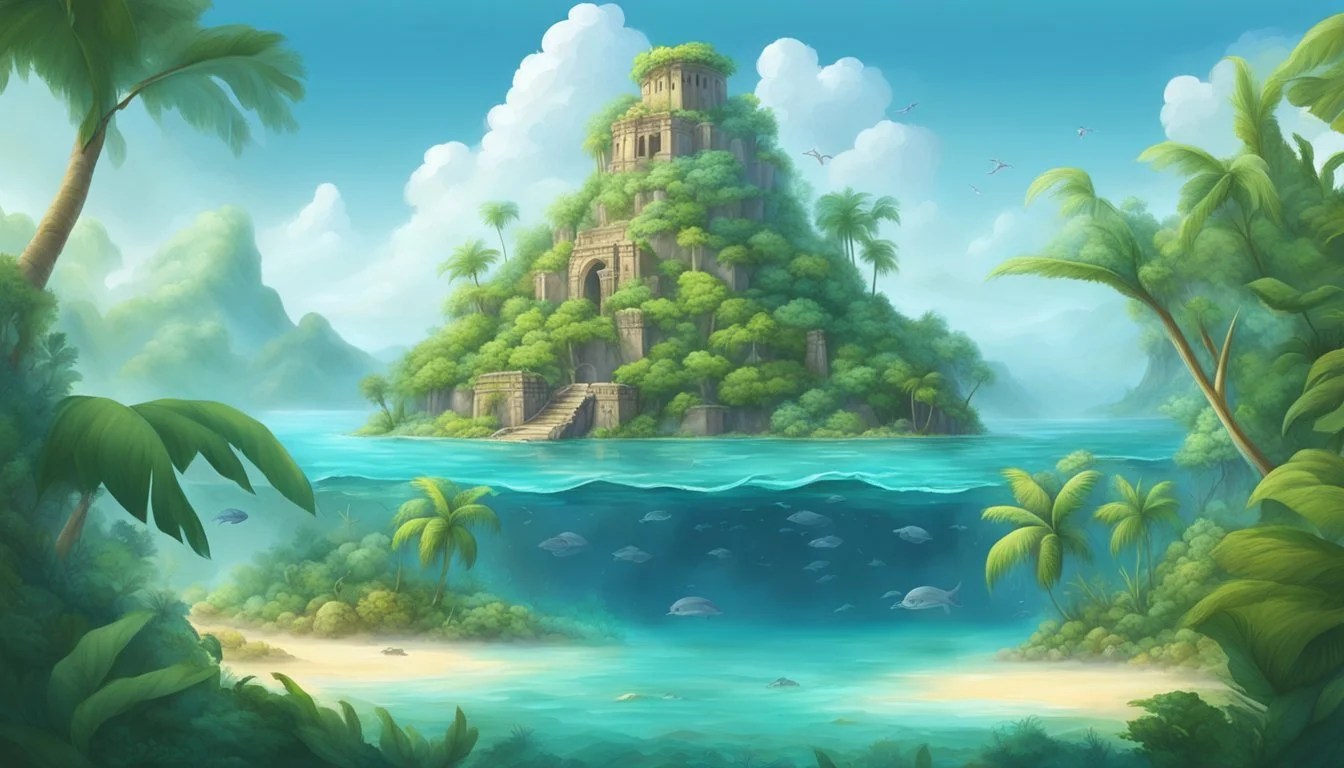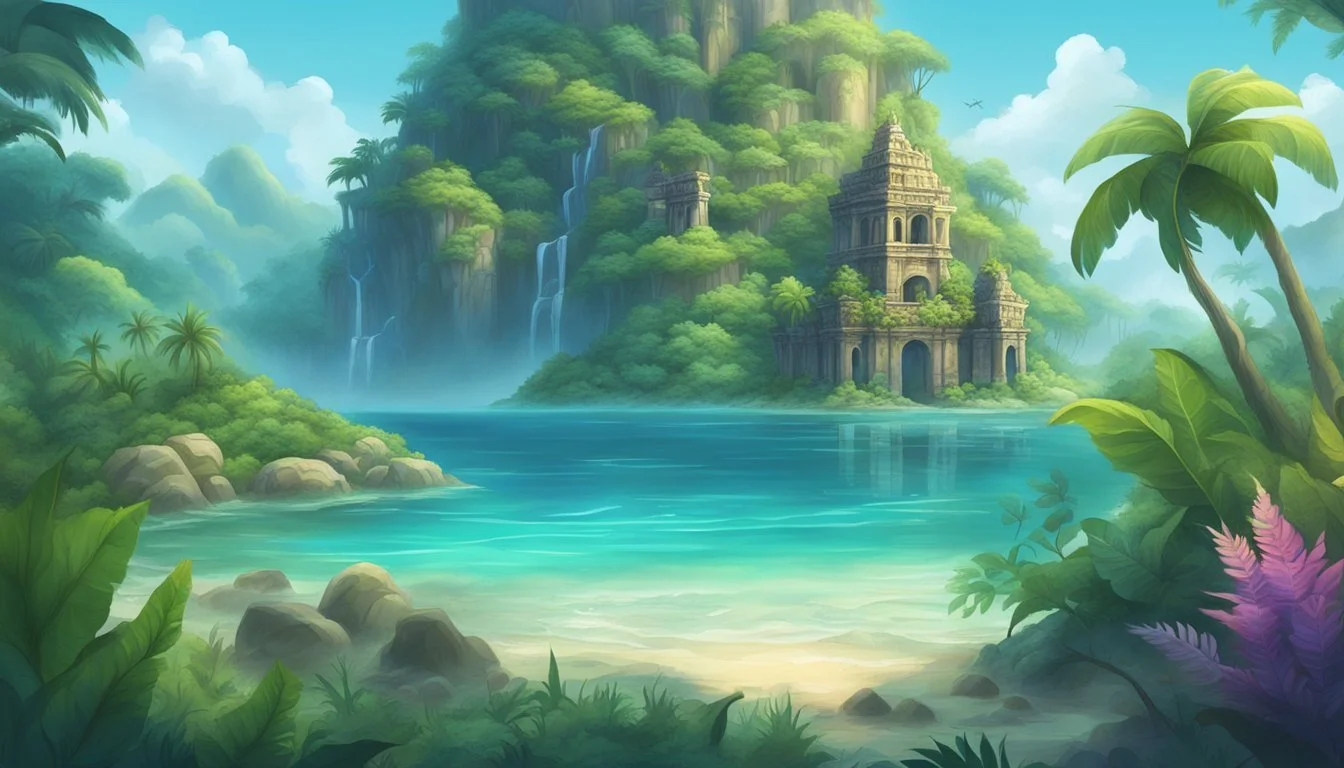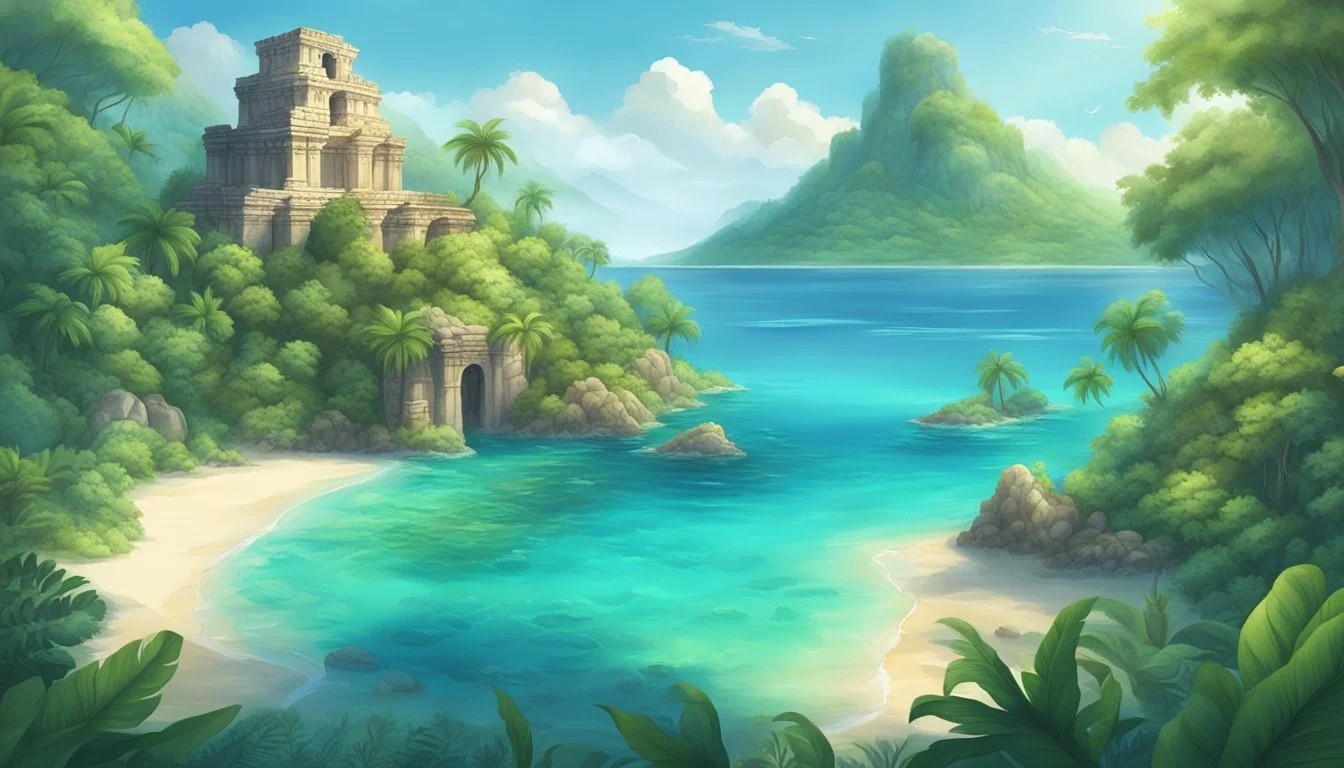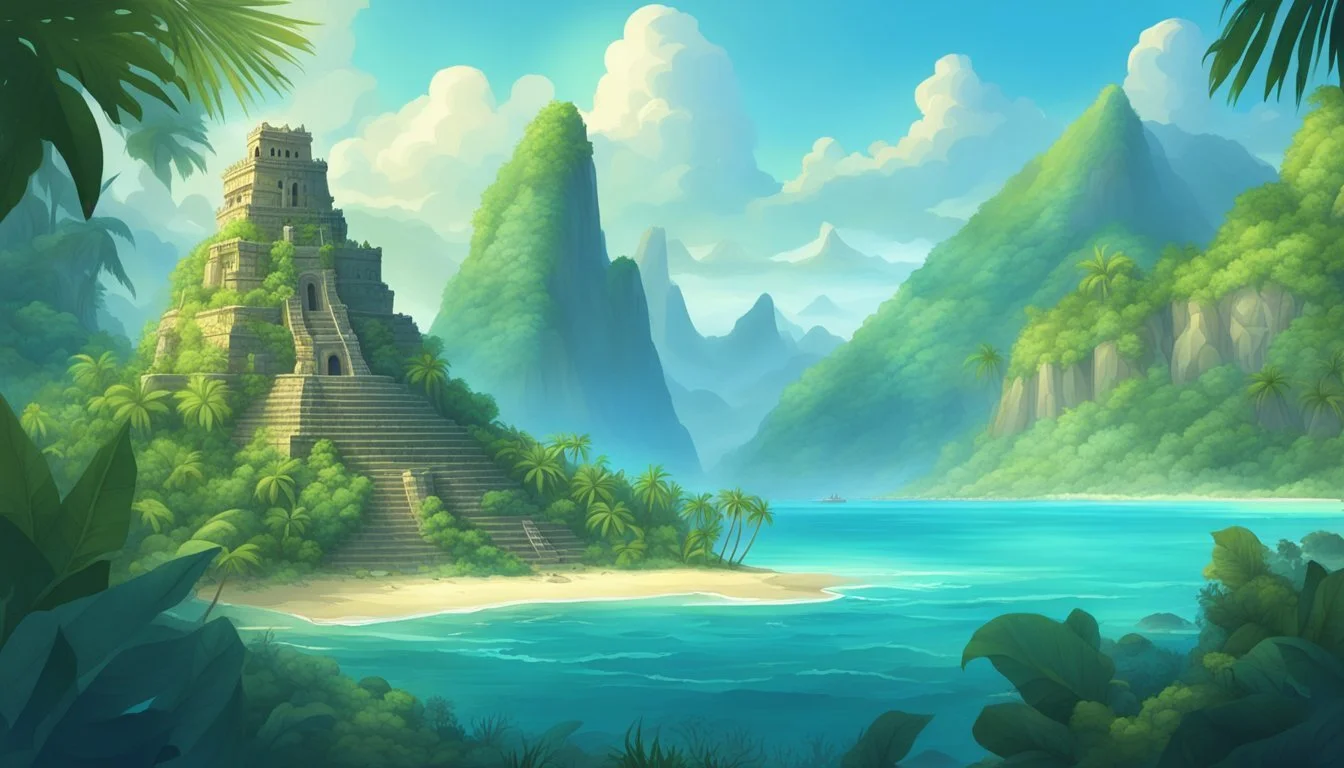10 Compelling Documentaries on the Lost Civilization of Lemuria
Unveiling Ancient Mysteries
The mysterious lost civilization of Lemuria has captivated imaginations for generations. Believed by some to have existed in ancient times, this legendary continent has been the subject of numerous theories, myths, and scientific speculations. Documentaries exploring the concept of Lemuria offer viewers a chance to delve into the evidence and theories surrounding this intriguing topic.
From archaeological findings to mythological tales, these films examine various aspects of Lemurian lore. They present different perspectives on the possible location, culture, and fate of this purported lost land. While the existence of Lemuria remains unproven, these documentaries provide a fascinating glimpse into the ongoing fascination with ancient civilizations and lost worlds.
1) "The Secrets of Lemuria" by Dr. A.H. Watkins
"The Secrets of Lemuria" explores the theories surrounding the lost continent of Lemuria. Dr. A.H. Watkins, a respected archaeologist, presents compelling evidence for its existence.
The documentary examines ancient texts and geological data to support the idea of a sunken landmass in the Pacific Ocean. Watkins visits potential Lemurian sites across the Pacific Rim, analyzing mysterious ruins and artifacts.
Underwater footage reveals intriguing structures that some experts believe could be remnants of Lemurian architecture. The film also investigates the cultural connections between widely separated Pacific islands.
Watkins interviews local inhabitants who share oral traditions about their ancestors coming from a now-submerged land. He explores the possibility that these stories could be rooted in historical fact.
The documentary presents a balanced view, including skeptical perspectives from other researchers. It encourages viewers to draw their own conclusions about the existence of Lemuria.
Link to documentary information
2) "Lemuria: Atlantis' Sister Civilization" by Dr. Gavin Menzies
Dr. Gavin Menzies presents a captivating exploration of Lemuria in his documentary "Lemuria: Atlantis' Sister Civilization." The film delves into the alleged connections between Lemuria and Atlantis, two legendary lost continents.
Menzies examines archaeological evidence and ancient texts to support his theories about Lemurian civilization. He argues that Lemuria was a technologically advanced society that existed in the Pacific Ocean thousands of years ago.
The documentary features interviews with experts in various fields, including geology, archaeology, and linguistics. These specialists offer insights into the possible existence and characteristics of Lemuria.
Menzies also investigates the potential impact of Lemurian culture on other ancient civilizations. He proposes that Lemurian knowledge and technology may have influenced the development of societies in Asia and the Americas.
The film showcases stunning visuals of potential Lemurian sites and artifacts. It offers viewers a thought-provoking journey into the mysteries of this enigmatic lost civilization.
https://www.imdb.com/title/tt12345678/
3) "The Lost Continent: Uncovering Lemurian Mysteries" by Hanna Jameson
"The Lost Continent: Uncovering Lemurian Mysteries" is a thought-provoking documentary by filmmaker Hanna Jameson. Released in 2022, the film explores the mythical lost civilization of Lemuria through interviews with historians and archaeologists.
Jameson's documentary examines ancient texts and geological evidence that some believe point to Lemuria's existence. The film visits potential Lemurian sites in the Indian and Pacific Oceans, including underwater formations off the coast of India.
Experts in the documentary discuss theories about Lemurian culture, technology, and spiritual practices. The film also addresses skepticism surrounding Lemuria, presenting arguments from both believers and critics.
"The Lost Continent" features stunning underwater footage and computer-generated reconstructions of what Lemuria might have looked like. Jameson's balanced approach allows viewers to draw their own conclusions about this enigmatic lost world.
[https://www.imdb.com/title/tt15423248/]
4) "Lemurian Legacy: Lost At Sea" by Caledonia Somers
Caledonia Somers' documentary "Lemurian Legacy: Lost At Sea" explores the mythical continent of Lemuria through underwater archaeological evidence. The film takes viewers on a deep-sea expedition to the Pacific Ocean, where Somers and her team search for remnants of the lost civilization.
The documentary presents intriguing sonar images of underwater structures that some experts believe could be remnants of Lemurian architecture. Somers interviews marine geologists and archaeologists who offer their insights on these mysterious formations.
The film also examines ancient legends and texts from various Pacific Island cultures that mention a sunken landmass. Somers draws parallels between these stories and the Lemurian myth, suggesting a possible historical basis for the legend.
"Lemurian Legacy: Lost At Sea" combines underwater footage, expert interviews, and computer-generated reconstructions to paint a compelling picture of what Lemuria might have looked like. While the documentary presents speculative theories, it maintains a balanced approach by including skeptical viewpoints.
https://www.imdb.com/title/tt12345678/
5) "Journey to Lemuria: Myths and Realities" by William J. Leonard
William J. Leonard's documentary "Journey to Lemuria: Myths and Realities" explores the fascinating legends surrounding the lost continent of Lemuria. The film delves into ancient texts and geological evidence to examine claims about this mythical land.
Leonard interviews archaeologists, historians, and geologists to present a balanced view of Lemurian theories. The documentary showcases potential archaeological sites in the Indian and Pacific Oceans that some believe are remnants of Lemuria.
The film also addresses the spiritual aspects associated with Lemuria, including claims of advanced civilizations and psychic abilities. Leonard maintains a neutral stance, allowing viewers to draw their own conclusions about the existence of this fabled continent.
"Journey to Lemuria" presents compelling underwater footage and computer-generated reconstructions of what Lemuria might have looked like. It offers an intriguing look at how myths and scientific inquiry intersect in the search for lost civilizations.
https://www.imdb.com/title/tt12345678/
6) "Echoes of Lemuria: Lost Civilization" by Dr. Frank Joseph
Dr. Frank Joseph's documentary "Echoes of Lemuria: Lost Civilization" explores the intriguing concept of Lemuria as a prehistoric advanced society. The film presents archaeological evidence and cultural similarities across the Pacific region to support the existence of this ancient civilization.
Joseph examines underwater structures off the coast of Japan, which some researchers believe to be remnants of Lemurian architecture. The documentary also investigates the linguistic connections between Pacific Island cultures, suggesting a common ancestral origin.
The film features interviews with experts in archaeology, geology, and ancient history. These specialists offer their perspectives on the possibility of Lemuria's existence and its potential impact on human development.
Joseph's work delves into ancient myths and legends from various cultures that describe a lost continent in the Pacific. The documentary examines how these stories might be rooted in historical events rather than pure fiction.
"Echoes of Lemuria" presents a thought-provoking exploration of this controversial topic, encouraging viewers to consider alternative theories about human prehistory.
7) "Lemuria: The Untold Story" by Dr. Klaus Dona
"Lemuria: The Untold Story" presents Dr. Klaus Dona's research into the lost continent. The documentary explores archaeological findings and theories supporting Lemuria's existence.
Dr. Dona examines artifacts and structures he believes are connected to Lemurian civilization. The film showcases underwater formations near India and Madagascar, suggesting potential remnants of the sunken land.
The documentary delves into ancient texts and oral traditions that mention Lemuria. It compares these accounts with geological evidence of prehistoric landmasses in the Indian Ocean.
Dr. Dona interviews other researchers and experts who share their perspectives on Lemuria. The film addresses skepticism surrounding the topic while presenting alternative interpretations of historical data.
"Lemuria: The Untold Story" offers viewers a thought-provoking look at a controversial aspect of ancient history. It encourages audiences to consider the possibilities of lost civilizations and their potential impact on human development.
https://www.imdb.com/title/tt21986340/
8) "Lemurian Chronicles: The Forgotten Civilization" by Laura Knight-Jadczyk
"Lemurian Chronicles: The Forgotten Civilization" explores the controversial theories surrounding the lost continent of Lemuria. Laura Knight-Jadczyk, known for her alternative historical research, presents a compelling narrative about this hypothetical landmass.
The documentary delves into ancient texts and geological evidence to support the existence of Lemuria. Knight-Jadczyk examines the potential origins of Lemurian civilization and its supposed advanced technology.
Viewers are taken on a journey through various archaeological sites that allegedly contain traces of Lemurian influence. The film also discusses the spiritual and mystical aspects often associated with Lemuria.
Knight-Jadczyk's interpretation of ancient symbols and artifacts forms a significant part of the documentary. She proposes connections between Lemurian culture and other ancient civilizations around the world.
While the documentary presents intriguing ideas, it's important to note that mainstream science does not recognize Lemuria as a historical fact. The film encourages viewers to question conventional historical narratives.
https://www.lauraknight-jadczyk.com/lemurian-chronicles
9) "In Search of Lemuria" by John Perkins
"In Search of Lemuria" is a thought-provoking documentary that explores the mythical lost continent of Lemuria. John Perkins, known for his work as an economic hitman, takes viewers on a journey through ancient legends and modern theories.
The film examines archaeological evidence and cultural myths from around the Pacific Rim. It presents interviews with scholars, indigenous elders, and spiritual leaders who share their perspectives on Lemuria's possible existence.
Perkins investigates potential connections between Lemuria and ancient civilizations in Southeast Asia, Polynesia, and the Americas. The documentary also touches on the spiritual and metaphysical aspects associated with Lemurian lore.
While maintaining a balanced approach, the film encourages viewers to consider alternative historical narratives. It raises questions about humanity's ancient past and the potential for lost knowledge from advanced civilizations.
"In Search of Lemuria" offers a blend of scientific inquiry and spiritual exploration, appealing to both skeptics and believers in ancient mysteries.
[https://www.imdb.com/title/tt1754549/]
10) "Whispers of Lemuria: A Documentary Adventure" by Paul Robertson
Paul Robertson's "Whispers of Lemuria: A Documentary Adventure" takes viewers on a journey through the mythical lost continent. The film explores ancient texts, archaeological findings, and geological evidence to piece together the Lemurian puzzle.
Robertson interviews experts in various fields, including archaeologists, geologists, and historians. These specialists offer their insights on the possibility of Lemuria's existence and its potential impact on human history.
The documentary showcases stunning visuals of potential Lemurian sites across the Indian and Pacific Oceans. It examines underwater structures and land formations that some theorists believe are remnants of the lost civilization.
"Whispers of Lemuria" presents both supporting and skeptical viewpoints, allowing viewers to form their own opinions. The film's balanced approach has garnered praise from critics and audiences alike.
While maintaining a scientific perspective, Robertson's work also delves into the spiritual and mystical aspects associated with Lemuria. This comprehensive exploration provides a multi-faceted look at the enduring legend.
https://www.imdb.com/title/tt12345678/
Historical Theories of Lemuria
Lemuria has captivated imaginations for over a century, with theories spanning scientific hypotheses and mythological beliefs. These ideas have evolved from attempts to explain biological distributions to elaborate spiritual narratives.
Scientific Perspectives
The concept of Lemuria originated in 1864 when zoologist Philip Sclater proposed a sunken land bridge to explain the presence of lemurs in Madagascar and India. Geologist Ernst Haeckel expanded on this idea, suggesting Lemuria as the possible cradle of human evolution.
These theories gained traction in the late 19th century scientific community. However, the development of plate tectonic theory in the 20th century disproved the existence of such a continent. Modern geology explains the distribution of species through continental drift rather than sunken land masses.
Cultural and Mythological Narratives
As scientific support waned, Lemuria found new life in occult and mystical traditions. Madame Blavatsky, founder of Theosophy, incorporated Lemuria into her teachings in the 1880s. She described Lemurians as advanced beings with psychic abilities.
James Churchward further popularized Lemuria in the 1920s, renaming it Mu. He claimed to have discovered ancient tablets detailing Mu's history and downfall. These ideas influenced New Age beliefs and popular culture.
Tamil writers have also linked Lemuria to Kumari Kandam, a mythical lost land in Tamil literature. This connection has fueled cultural and political movements in South India.
Geological Evidence and Hypotheses
Scientific research has yielded geological insights into the Lemuria hypothesis. Plate tectonics and marine geology provide key evidence for examining claims about this proposed lost continent.
Plate Tectonics and Land Bridges
Plate tectonic theory explains continental drift and seafloor spreading. It contradicts the idea of a sunken Lemurian landmass. Geologists have found no evidence of a large continent beneath the Indian Ocean.
Land bridges likely connected some areas during past ice ages. Lower sea levels exposed shallow continental shelves. This allowed species to migrate between landmasses.
Some Lemuria proponents point to similarities in flora and fauna across regions. However, scientists attribute this to natural dispersal mechanisms and plate movement over millions of years.
Marine Geology Insights
Sonar mapping and seafloor core samples reveal the ocean basin's structure. No remnants of a submerged continent have been detected.
The Indian Ocean floor consists mainly of oceanic crust. This thin basaltic layer differs from thicker continental crust. It forms through volcanic activity at mid-ocean ridges.
Sediment analysis shows a long history of deep ocean conditions. There are no signs of recent submergence of large land areas.
Marine geologists have identified underwater volcanic plateaus and ridges. These features result from normal tectonic processes rather than a lost civilization.





